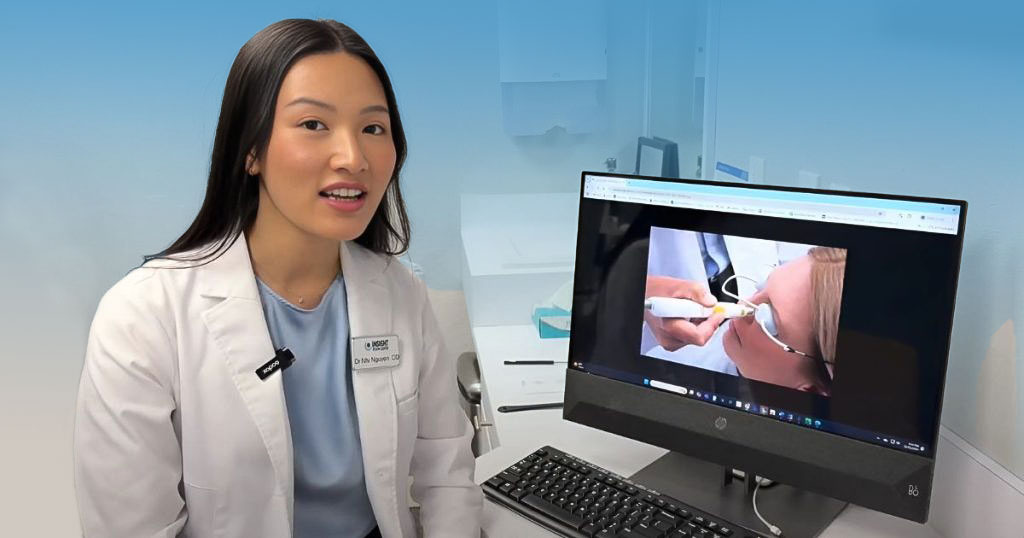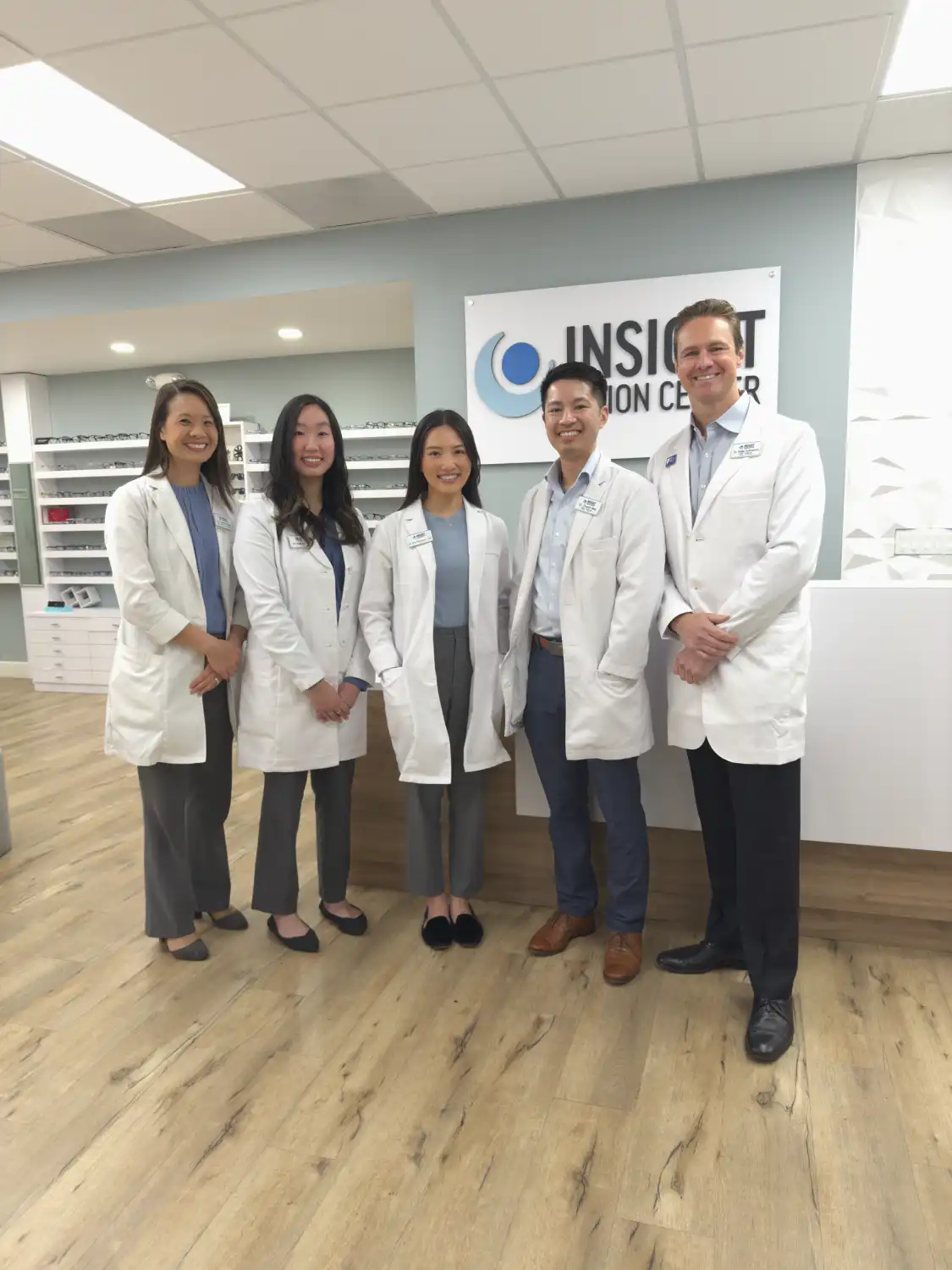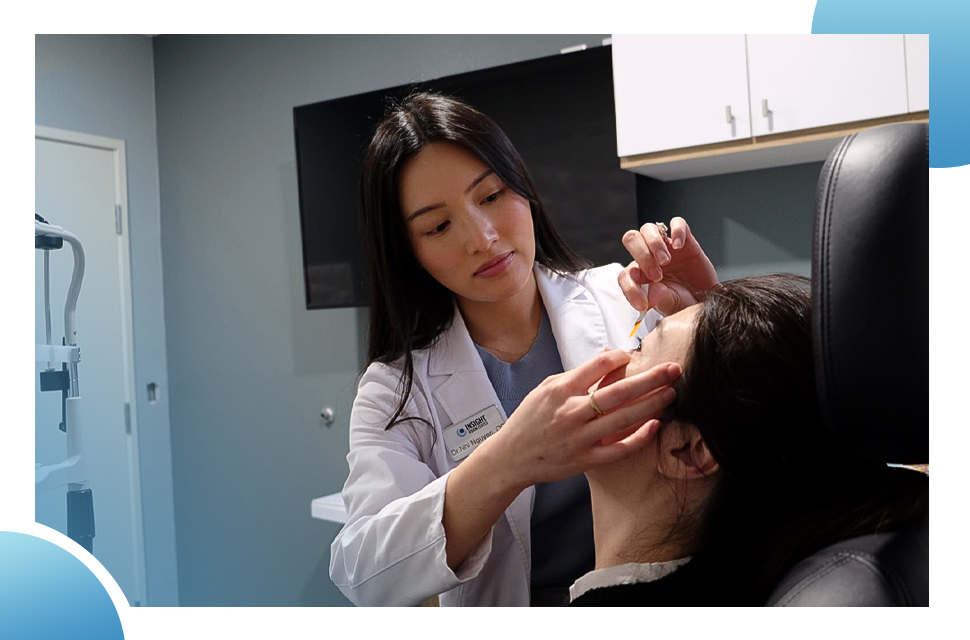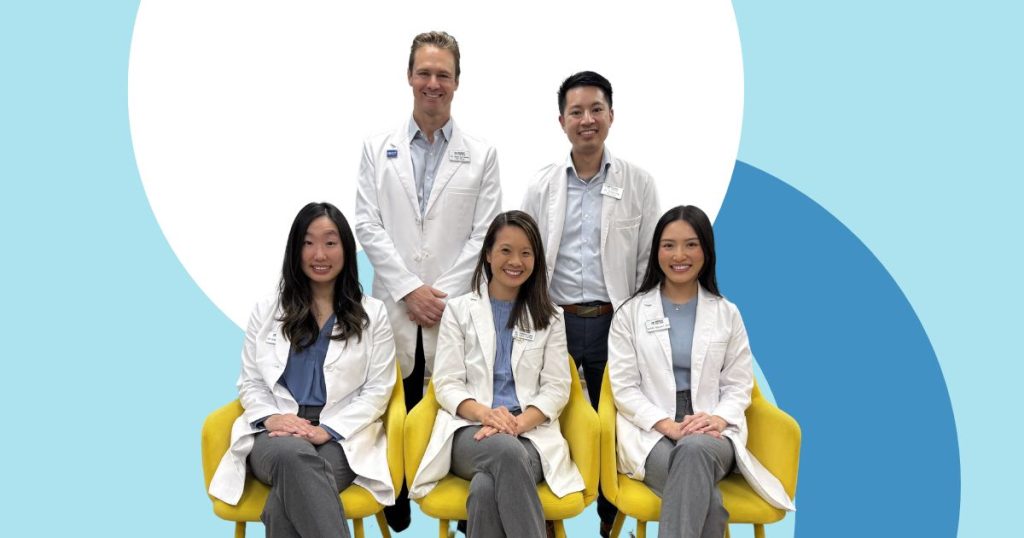
If you’re struggling with dry eye symptoms and wondering why they persist, the answer may lie in your sleep quality. At Insight Vision Center Optometry, our eye doctors understand that poor sleep can exacerbate dry eye issues, making it crucial to identify the relationship between the two. Read on to learn how improving your sleep can lead to greater eye comfort and overall health.
The Connection Between Sleep and Dry Eye
on’t get enough quality sleep, our bodies produce stress hormones like cortisol and epinephrine at higher levels. These hormones can interfere with normal tear production, leading to changes in both the quantity and quality of our tears. In essence, without adequate sleep, the tear film that lubricates and protects the eye can become unstable, setting the stage for dry eye symptoms.
Numerous studies have revealed a strong association between sleep quality and dry eye. For example, research indicates that individuals with poor sleep habits are about 50% more likely to experience dry eye symptoms compared to those who have regular, restorative sleep. Moreover, patients already suffering from dry eye are 1.5 times more likely to be poor sleepers. This cyclical relationship shows that sleep and ocular surface health are more interconnected than many of us realize.
How Poor Sleep Affects Tear Production and the Ocular Surface
derstand how poor sleep may cause dry eye, it’s helpful to look at the physiological changes that occur during sleep deprivation. First, insufficient sleep disrupts the normal homeostasis of tear secretion; when the body is stressed, tear production often decreases. This drop in tear volume means that the delicate balance required for a protective tear film is disturbed.
Animal studies have provided further insight. In murine models, researchers observed that sleep deprivation can alter the microvilli structure on the surface of corneal epithelial cells. These tiny projections play a crucial role in maintaining the spread and stability of the tear film. Abnormalities in their structure can lead to increased tear evaporation and, ultimately, dry eye. In another study, sleep-deficient mice showed reduced aqueous tear secretion and noticeable defects in the corneal epithelial cells, emphasizing how lack of sleep impairs the eye’s natural lubrication system.
Bidirectional Relationship: How Dry Eye Can Disrupt Sleep
It’s important to note that the relationship between sleep and dry eye isn’t one-sided. While inadequate sleep can cause changes in tear film stability and lead to dry eye, the discomfort inherent in dry eye can also interfere with a good night’s rest. Many patients report difficulty falling asleep or experiencing frequent awakenings due to the irritation and pain caused by dry eye symptoms.
This bidirectional relationship forms a vicious cycle. When the eyes are dry and irritated during the day, they can interfere with nighttime comfort, leading to fragmented, restless sleep. In turn, this poor sleep further exacerbates the symptoms by reducing tear secretion and worsening ocular surface health. This cycle can be particularly distressing, as it not only diminishes quality of sleep but also continuously undermines overall eye health.
What Research and Clinical Studies Show
Recent research has shed light on just how closely dry eye disease and poor sleep quality are related. Here’s a summary of some significant findings:
These findings underscore the importance of addressing both poor sleep and dry eye in clinical practice. The evidence suggests that without improvements in sleep quality, even the most advanced treatments for dry eye may have limited success.
- Increased Risk: Studies have shown that individuals who sleep less than the recommended 7 to 9 hours per night are 50% more likely to suffer from dry eye symptoms compared to those with adequate sleep.
- Poor Sleep Quality: Patients with dry eye generally report poorer sleep quality, greater daytime sleepiness, and more frequent disturbances during sleep, which further compound the dry eye condition.
- Animal Models: Murine studies have illustrated that sleep deprivation leads to changes in the corneal epithelium and reduced tear secretion. These changes exemplify how lack of sleep directly influences ocular surface integrity.
- Sleep Disorders: Sleep-related conditions such as insomnia, sleep apnea, and even parasomnias have been linked to an increased prevalence of dry eye. For instance, conditions like sleep apnea not only disrupt sleep but also appear to correlate with significant ocular surface disturbances.
- Psychological Impact: The discomfort of dry eye can also contribute to psychological stress and depression, which are known to worsen sleep quality. This creates a self-reinforcing loop that can be challenging to break without targeted intervention.

Lifestyle and Sleep Hygiene Tips for Managing Dry Eye
- Establish a Consistent Sleep Schedule: Going to bed and waking up at the same time every day helps regulate your body’s internal clock. Consistency in your sleep schedule can lead to a more restful sleep, allowing your eyes ample time to recover and maintain adequate tear production.
- Create a Relaxing Pre-Bed Routine: Engage in calming activities before bed, such as reading a book, taking a warm bath, or practicing meditation. This slowing down can ease the transition from wakefulness to sleep and reduce overall stress levels.
- Use a Sleep Mask or Protective Eyewear: For some patients, especially those who experience incomplete eyelid closure during sleep, using a sleep mask or special moisture chamber goggles can help protect the eyes from air exposure. This approach can retain moisture and guard against irritation.
- Limit Screen Time and Bright Lights Before Bed: Exposure to blue light from digital devices or lighting can interfere with your natural sleep signals. Try turning down the lights and avoiding screens at least two hours before bedtime to minimize eye strain and support better sleep quality.
- Optimize Your Sleep Environment: Keep your bedroom cool and dark. Using a humidifier can also help maintain moisture in the air, reducing the risk of your eyes drying out during the night.
- Practice Proper Eyelid Hygiene: Regular cleaning of your eyelids can reduce the buildup of debris and bacteria that may worsen both dry eye and sleep-related disturbances.

Integrating Sleep Assessments into Dry Eye Evaluations
When sleep issues are identified, it is not only about recommending better sleep hygiene but also about making the appropriate referrals. For example, if a patient shows signs of sleep apnea, we advise further evaluation by a sleep specialist. Addressing these sleep disorders may lead to an improvement in both sleep quality and the severity of dry eye symptoms, creating a more favorable overall treatment outcome.

How Research Supports the Link Between Poor Sleep and Dry Eye
Let’s delve a little deeper into the research that backs up the connection between poor sleep and dry eye.
A large-scale study involving over 71,000 participants found that dry eye patients not only suffer from ocular discomfort but also report poor sleep quality across all age groups and genders. This extensive dataset reinforces the observation that dry eye and poor sleep frequently coexist.
Furthermore, clinical research performed on animal models has provided clear evidence of the physiological changes in the eye due to sleep deprivation. For instance, during periods of sleep deficiency, studies have noted a reduction in tear secretion and an increase in tear film instability. These changes result in saltier tears, a phenomenon known medically as tear hyperosmolarity – which is a hallmark of dry eye disease.
Another key takeaway from the research is that the disruption of normal tear film dynamics due to lack of sleep can significantly elevate corneal sensitivity. This heightened sensitivity not only leads to chronic discomfort but also predisposes the ocular surface to further damage if left unchecked.
Additionally, some studies have explored the relationship between sleep duration and the prevalence of dry eye symptoms. Findings indicate that individuals who consistently sleep fewer hours – especially less than the recommended 7.5 to 8 hours – are at a higher risk for both developing and experiencing more severe dry eye symptoms. This is believed to be partly due to the increased production of stress hormones during periods of sleep deprivation, which directly impacts tear production and ocular surface health.

The Highest Rated Advanced Eye Care Center In Orange County

What Our Patients are Saying
“I love this office! The staff is so friendly, helpful, and welcoming. Dr. Lam has helped with my dry eye symptoms and myopia and takes the time to explain things thoroughly. I never feel like she is rushing me out of the office to see the next patient. She is extremely knowledgeable and I feel very well cared for. I highly recommend this office!”
⭐⭐⭐⭐⭐
Elaine N.
“More recently I had an issue with super dry eyes and they provided me multiple solutions and care instructions to heal them quickly. What I like is that it’s not all about just solving the issue, they taught me about long term care and what to change to ensure my eyes get the hydration they need.”
⭐⭐⭐⭐⭐
Maria M.
What You Can Expect from a Comprehensive Dry Eye Evaluation
During a comprehensive eye exam, our eye doctors look at more than just your vision. They assess the condition of your tear film, measure tear break-up time, and evaluate the health of your ocular surface. This detailed evaluation is critical in understanding whether poor sleep may be contributing to your dry eye symptoms.
If poor sleep is identified as a potential factor, a personalized treatment plan may be developed and a referral to a sleep specialist may be recommended. This plan might include recommendations for improved sleep hygiene, alongside traditional dry eye treatments such as artificial tears or prescription medications. In some cases, interventions like eyelid hygiene or tear retention techniques (for example, using punctual plugs) might also be recommended.
By addressing both the symptoms and the underlying causes—including poor sleep—our goal is to help you achieve lasting relief from dry eye discomfort. Improved treatment outcomes have been observed when sleep and ocular surface management are addressed together, underscoring the benefits of a comprehensive, holistic approach.

Bringing It All Together
In conclusion, the evidence strongly suggests that poor sleep can indeed cause or exacerbate dry eye symptoms. From the effect of stress hormones on tear production to disruptions in the delicate balance of your tear film, lack of quality sleep plays a significant role in ocular surface health. The bidirectional nature of this relationship means that dry eye symptoms can further interfere with your sleep, creating a challenging cycle that demands a comprehensive treatment strategy.
Our eye doctors are committed to helping you break this cycle by addressing every aspect of your health. By integrating sleep assessments into dry eye evaluations and recommending actionable lifestyle adjustments, we aim to support both your ocular and overall well-being. Whether it’s through improved sleep hygiene, environmental modifications, or targeted ocular treatments, every step taken towards better sleep can lead to improvement in dry eye symptoms.
If you’re experiencing symptoms of dry eye and suspect that your sleep habits might be contributing, we encourage you to reach out to our office. With a thorough evaluation and a personalized treatment plan, our dedicated team is here to help you achieve lasting relief and improved quality of life.
The Research
There is a significant body of research on the relationship between sleep and dry eye, here are some studies for further investigation.
- Tang, L., Wang, X., Wu, J., et al. (2018). Sleep deprivation induces dry eye through inhibition of PPARα expression in corneal epithelium.
- Karaca, I., Yagci, A., Palamar, M., Tasbakan, M.S., & Basoglu, O.K. (2019). Ocular surface assessment and morphological alterations in Meibomian glands with meibography in obstructive sleep apnea Syndrome.
- Au, N.H., Mather, R., To, A., & Malvankar-Mehta, M.S. (2019). Sleep outcomes associated with dry eye disease: a systematic review and meta-analysis.
- Li, S., Ning, K., Zhou, J., et al. (2018). Sleep deprivation disrupts the lacrimal system and induces dry eye disease.
- Uchino, M. & Schaumberg, D.A. (2013). Dry Eye Disease: Impact on Quality of Life and Vision.
- Ayaki, M., Toda, I., Tachi, N., et al. (2016). Preliminary report of improved sleep quality in patients with dry eye disease after initiation of topical therapy.
- Wu, M., Liu, X., Han, J., et al. (2019). Association Between Sleep Quality, Mood Status, and Ocular Surface Characteristics in Patients With Dry Eye Disease.
- Magno, M.S., Utheim, T.P., Snieder, H., et al. (2021). The relationship between dry eye and sleep quality.
- Li, A., Zhang, X., Guo, Y., et al. (2022). The Association Between Dry Eye and Sleep Disorders: The Evidence and Possible Mechanisms.
- Ayoubi, M., Cabrera, K., Mangwani, S., et al. (2024). Associations between dry eye disease and sleep quality: a cross-sectional analysis.
- Zheng, Y., Wu, X., Lin, X., & Lin, H. (2017). The prevalence of depression and depressive symptoms among eye disease patients: a systematic review and meta-analysis.
- Lee, Y.B., Koh, J.W., Hyon, J.Y., et al. (2014). Sleep deprivation reduces tear secretion and impairs the tear film.

Why choose Insight Vision Center Optometry in Costa Mesa, CA, for Dry Eye Treatment?
Insight Vision Center Optometry is a premier advanced eye care clinic in Orange County, known for its expertise in managing dry eye and ocular surface diseases using advanced treatments. With over 600 positive patient reviews and a 4.9-star rating on Google and Yelp, our highly trained eye doctors utilize state-of-the-art IPL and other technologies to deliver safe and effective treatments.
If you’re interested in exploring Dry Eye treatment, contact Insight Vision Center Optometry in Costa Mesa, CA
Call us at (714) 942-1361 to book your appointment, or schedule online.





